-
- Market Research
- |
- CBD Near Me
- |
- Giveaways
- |
- Newsletter
- |
- Contact
- |
- Advertise
- |
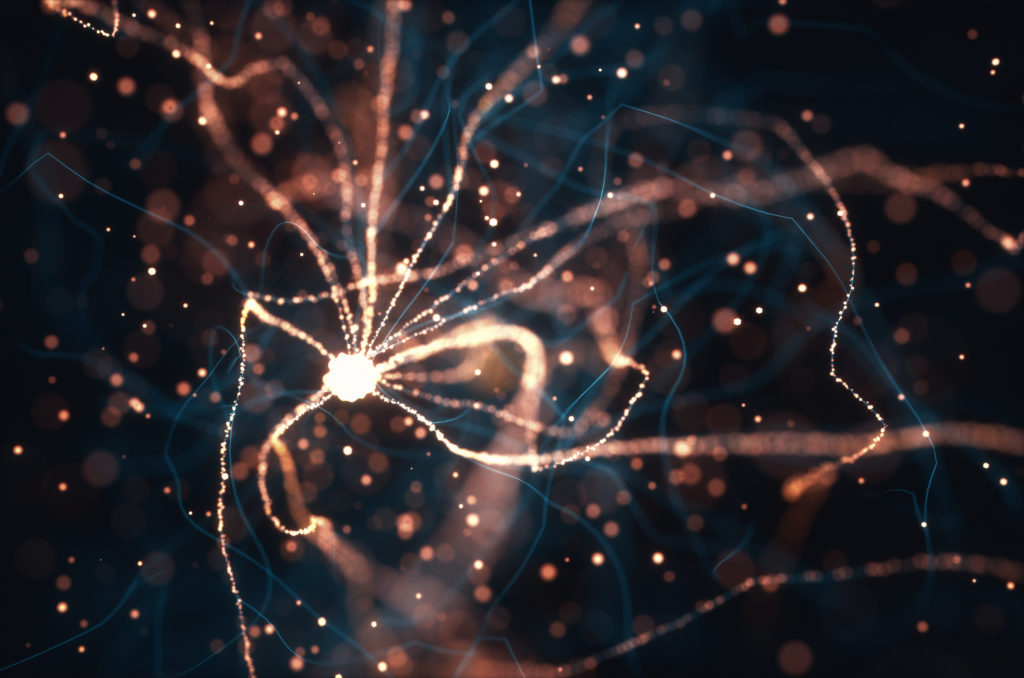
Neurotransmitters play a major role in the brain, helping neurons send and receive messages. Sometimes neurotransmitters can become imbalanced and, as a result, neurological disorders like Parkinson’s disease and others can occur. However, cannabidiol (CBD) can interact with these neurotransmitters and their receptors to provide specific benefits, such as relieving anxiety, protecting neurons from damage, and rebalancing neurotransmitter levels.
What are Neurotransmitters?
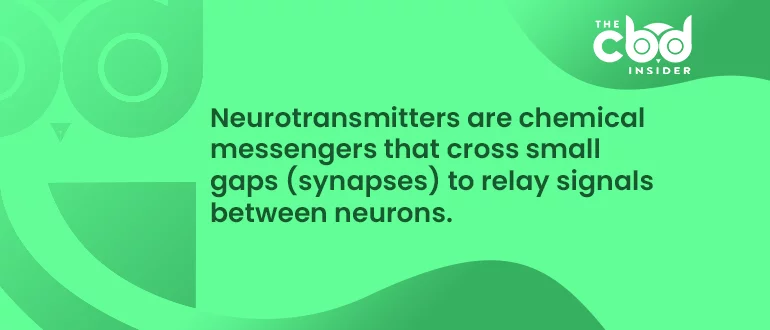
Neurotransmitters transmit messages between neurons.
The brain sends signals via neurons that carry messages to the proper areas of the body.
However, there are gaps between neurons called synapses.
This is where neurotransmitters come in.
After the axon (a long nerve fiber between neurons that signals travel through) sends an electrical impulse called action potential, neurotransmitters are released to either carry the message from the axon to the neuron or stop the message from sending.
After they do their job, neurotransmitters are broken down by enzymes or are absorbed by neurons.
Neurotransmitters and CBD
| NEUROTRANSMITTER | FUNCTIONS IT REGULATES | CONDITIONS IT’S LINKED TO | HOW CBD MAY HELP |
| ANANDAMIDE | mood, memory, neurogenesis | Deficiency may lead to stress-related anxiety disorders | CBD indirectly increases anandamide levels |
| 2-ARACHIDONOYL GLYCEROL (2-AG) | immune system, pain, neuron health | Deficiency may lead to migraine and irritable Bowel Syndrome | CBD indirectly increases 2-AG levels |
| GLUTAMATE | brain function, memory, gut health | Excess may lead to epilepsy, multiple sclerosis, neurodegenerative diseases, neuropathic pain, and migraine | CBD may prevent overproduction via antioxidant properties |
| DOPAMINE | motor function, emotional responses | Parkinson’s Disease | CBD may increase dopamine and protect neurons via antioxidant properties |
| SEROTONIN | mood, social behavior, cognitive functions | Deficiency may lead to anxiety disorders and depression | CBD may activate serotonin receptors to improve mood and relieve anxiety |
| ADENOSINE | cardiovascular health, inflammation, pain, sleep | May have a role in arrhythmia, epilepsy, inflammation, and sleep disorders | CBD may increase adenosine to prevent arrhythmia, seizures, inflammation, and insomnia |
| GABA | mood, sleep | May have a role in anxiety, depression, and PTSD | CBD may activate GABA receptors for anti-anxiety effects |
Several neurological disorders, such as Parkinson’s disease and Alzheimer’s disease, have been associated with dysfunction of specific neurotransmitters.
However, scientific research shows that CBD has helped normalize neurotransmitter levels, providing therapeutic benefits for these types of illnesses.
The following are specific neurotransmitters that research shows CBD interacts with:
Anandamide
Anandamide is an endocannabinoid that binds with cannabinoid receptors in the body.
It was named after the Sanskrit word “ananda” meaning happiness and joy because it is known to heighten mood.
Anandamide also regulates memory and promotes neurogenesis.
However, a deficiency in anandamide may cause some anxiety disorders.
According to a study by researchers at Vanderbilt University School of Medicine, anandamide deficiency can lead to stress-induced anxiety.
Anandamide activates the CB1 receptors in the endocannabinoid system (ECS).
CB1 receptors are abundant in the brain and nervous system, regulating mood and memory.
CBD can elevate anandamide levels by inhibiting anandamide’s enzyme, fatty acid amide hydrolase (FAAH).
This allows anandamide to produce its effects longer.
These effects include relieving anxiety, improving mood, and potentially disrupting fear memories, a useful effect in treating stress-induced anxiety in disorders like PTSD.
CBD may also help treat acne by its interaction with anandamide.
Anandamide synthesizes lipids (fat molecules) in the skin, which can lead to the production of sebum (an oily substance in the skin).
When sebocytes (cells that make sebum) overproduce sebum, it contributes to the development of acne.
CBD prevents anandamide from synthesizing lipids, making it a viable option for removing acne.
2-Arachidonoyl Glycerol (2-AG)
2-AG is another endocannabinoid neurotransmitter.
It primarily activates the CB2 receptor in the ECS.
The CB2 receptors are abundant in the immune system, thus, 2-AG helps modulate immune function.
It may also have analgesic and neuroprotective properties.
A deficiency in 2-AG, as well as anandamide, may contribute to the development of migraine and IBS.
CBD seems to increase levels of 2-AG by inhibiting its enzyme, much like CBD does with anandamide.
Glutamate
Glutamate is one of the most important and abundant neurotransmitters.
As an excitatory neurotransmitter, glutamate helps neurons fire to send messages.
Research shows that Glutamate helps with brain function, such as regulating memory.
It is also found in food and can help maintain a healthy gut.
However, excess glutamate is toxic to neurons and seems to be a major contributor to the development of several neurological disorders including epilepsy, multiple sclerosis, Alzheimer’s, neuropathic pain, and migraines.
Oxidation can lead to the overproduction of glutamate.
Since CBD is an antioxidant, it may help prevent excess production of glutamate.
CBD has also been shown to normalize glutamate by activating the CB2 and 5-HT1A (serotonin) receptors.
Dopamine
Dopamine is part of the reward system in the brain.
Its functions include regulating movement and emotional responses.
Dopamine deficiency is the major contributor to Parkinson’s disease, as the disease destroys the dopamine-producing neurons in the brain.
This leads to tremors and bradykinesia (slowness of movement), the hallmarks of Parkinson’s.
CBD may help reverse dopamine deficiency and protect neurons from damage.
Serotonin
Serotonin seems to be involved in mood, social behavior, and cognitive function.
Research points to serotonin deficiencies as the source of some anxiety disorders and possibly depression.
Antidepressants and anti-anxiety medications, which are usually selective serotonin reuptake inhibitors (SSRIs), help relieve depression and anxiety by promoting levels of serotonin in the brain.
CBD works similarly to an SSRI by targeting serotonin receptors, but it activates them itself.
Activating the serotonin receptors produces anxiolytic (i.e., anti-anxiety) effects by improving mood and relieving anxious feelings.
Adenosine
Adenosine is an inhibitory neurotransmitter, meaning it prevents neurons from firing and sending signals, which “quiets” the mind.
Since it is inhibitory, adenosine is believed to play a role in sleep.
Also, adenosine helps regulate the cardiovascular system and researchers believe it may have anticonvulsant properties.
CBD inhibits adenosine uptake, elevating levels of adenosine.
This interaction between CBD and adenosine may help regulate cardiovascular health by modulating blood circulation and preventing arrhythmia.
CBD may also produce some of its anti-inflammatory benefits via adenosine signaling.
GABA
Like adenosine, GABA (Gamma-aminobutyric acid) is an inhibitory neurotransmitter that helps with sleep and plays a role in anxiety.
GABA helps reduce anxiety and is intimately involved in fear memory and fear learning.
Research shows that CBD may activate GABA receptors to produce its anxiolytic effects.
CBD’s Interaction with Neurotransmitters is Promising
Neurotransmitters play essential roles in various functions controlled by your brain like sleep, anxiety, mood, emotions, memory, and other cognitive functions.
Thus, deficiencies or overproduction of certain neurotransmitters can lead to serious conditions.
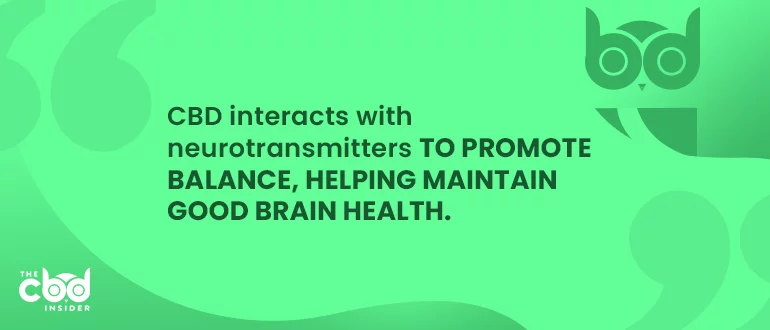
Thankfully, researchers are finding that CBD interacts with neurotransmitters to promote balance.
Promoting the balance of neurotransmitters is an important aspect of a healthy brain, and CBD seems to be a viable option for maintaining good brain health.
Has CBD helped you in your journey to wellness? If so, let us know your experience in the comments below!
Disclaimer: The content on this site is for informational purposes only. We are not medical experts and nothing should be construed as medical advice. Be sure to speak with your physician before taking CBD or any other treatment.


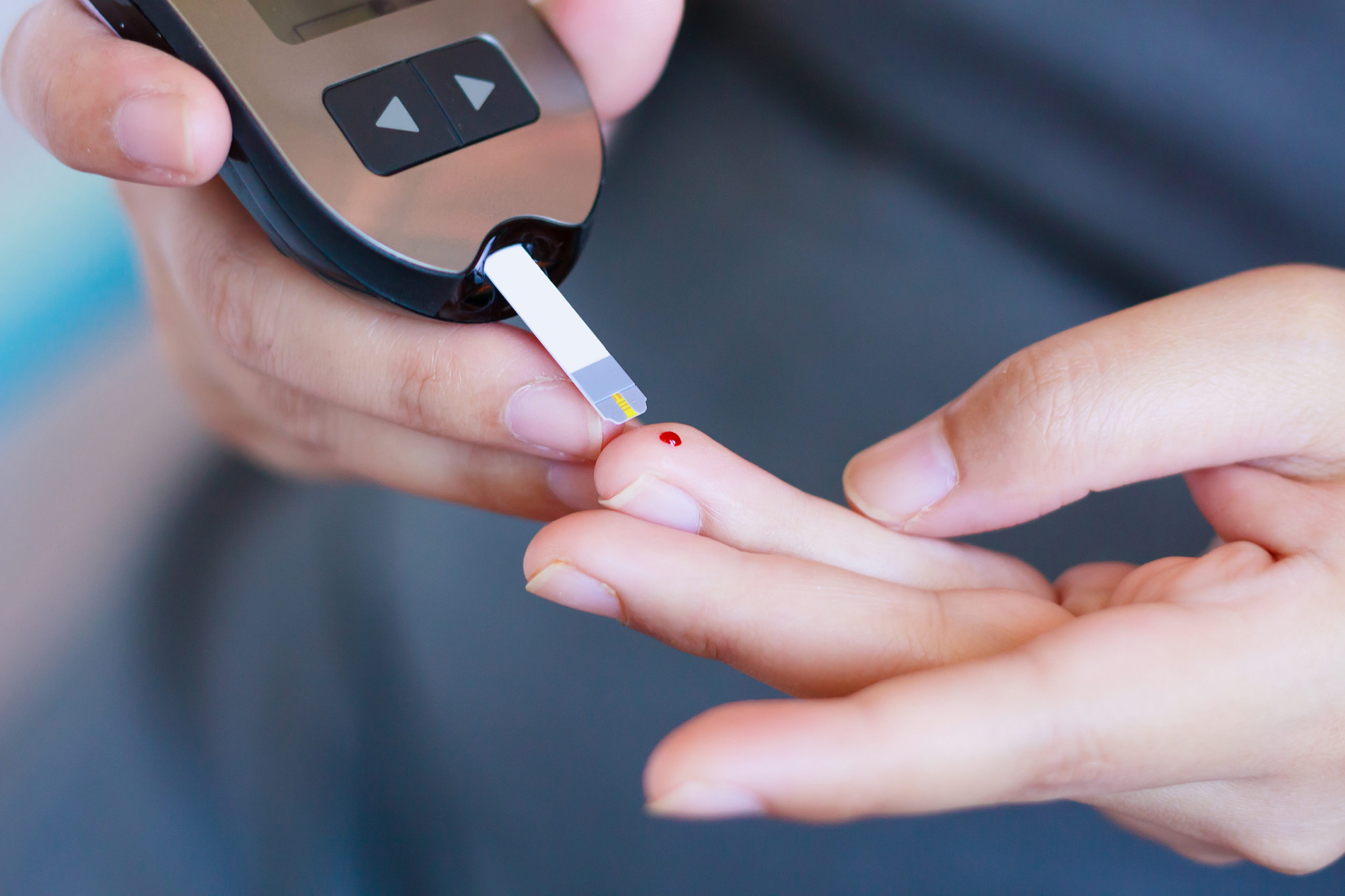


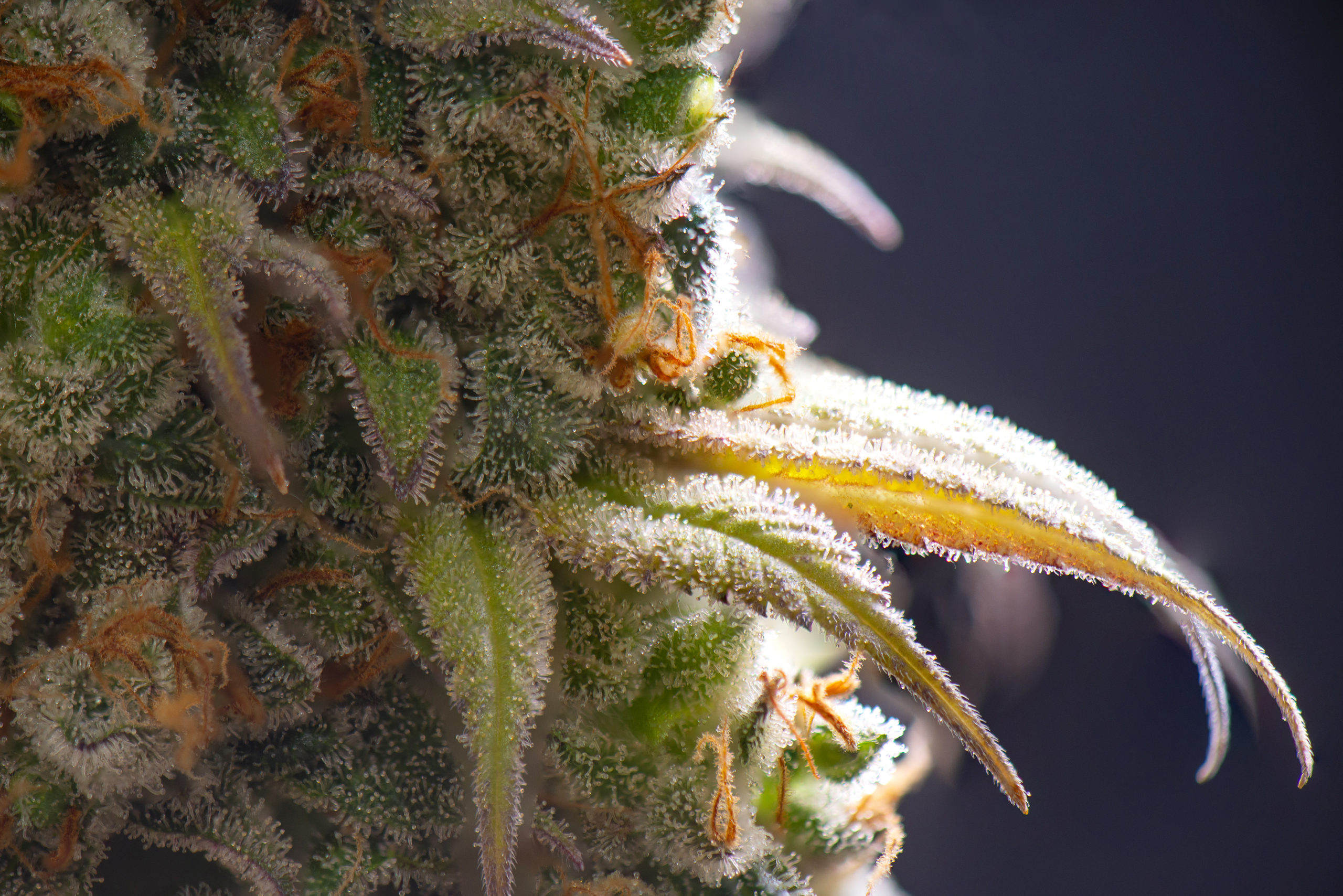

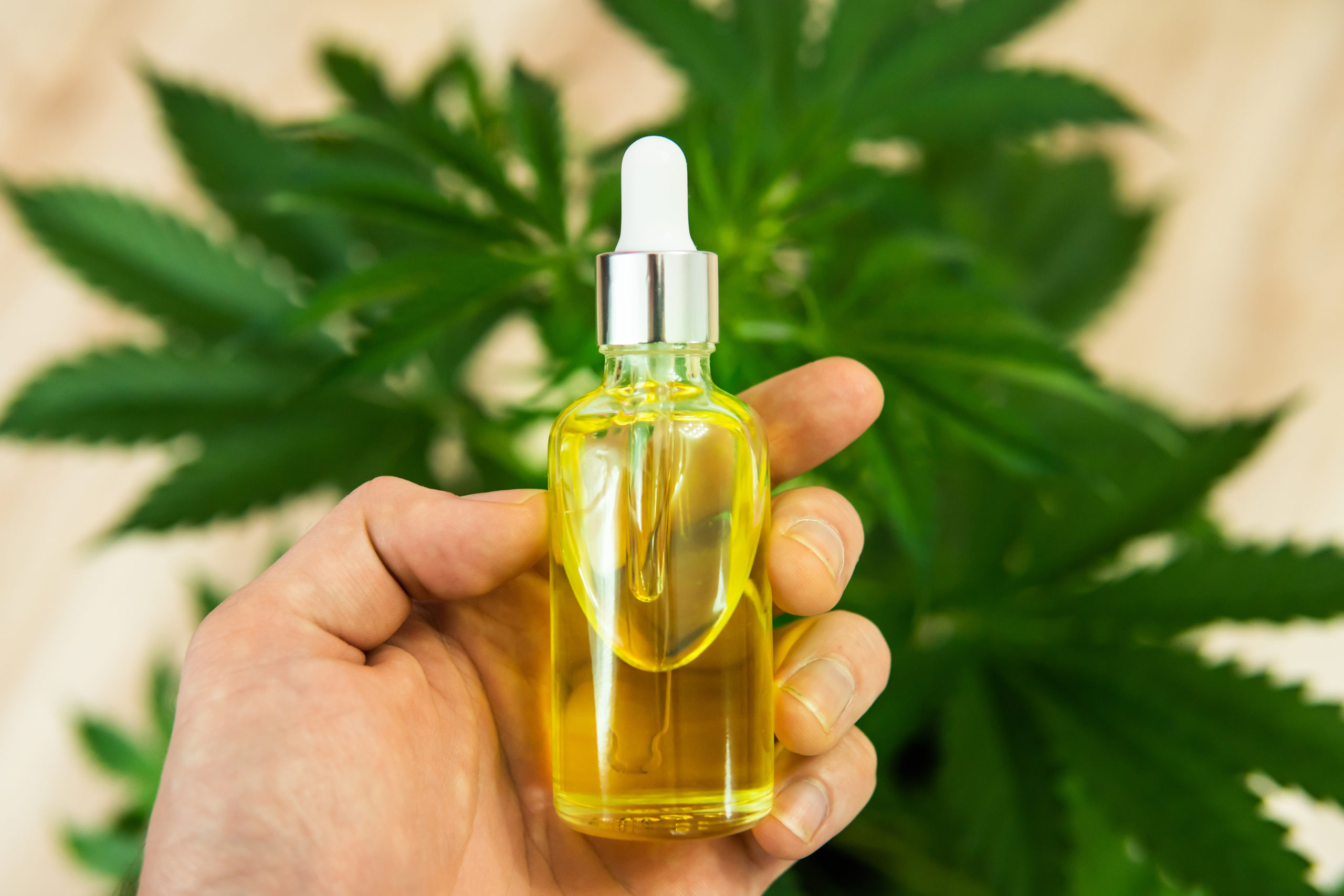
6 Comments
I didn’t read everything because it was way over my head. I can feel the effects of CBD so I know it is doing something and I like it. How ever Is this just covering up the problem as long as you take it or is repairing. Do I need to take more as time goes to get the same results?
Thanks for the feedback, Mike! There definitely needs to be more research conducted to answer those types of questions, and we will be sure to cover medical studies and research as it happens. Regarding tolerance, from what we’ve heard from our audience, most people don’t need to keep increasing the size of their dose. However, everyone is different, so, unfortunately, we don’t yet have a definitive answer.
I didn’t read everything because it was way over my head. I can feel the effects of CBD so I know it is doing something and I like it. How ever Is this just covering up the problem as long as you take it or is repairing. Do I need to take more as time goes to get the same results?
Thanks for the feedback, Mike! There definitely needs to be more research conducted to answer those types of questions, and we will be sure to cover medical studies and research as it happens. Regarding tolerance, from what we’ve heard from our audience, most people don’t need to keep increasing the size of their dose. However, everyone is different, so, unfortunately, we don’t yet have a definitive answer.
I didn’t read everything because it was way over my head. I can feel the effects of CBD so I know it is doing something and I like it. How ever Is this just covering up the problem as long as you take it or is repairing. Do I need to take more as time goes to get the same results?
Thanks for the feedback, Mike! There definitely needs to be more research conducted to answer those types of questions, and we will be sure to cover medical studies and research as it happens. Regarding tolerance, from what we’ve heard from our audience, most people don’t need to keep increasing the size of their dose. However, everyone is different, so, unfortunately, we don’t yet have a definitive answer.